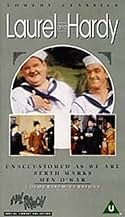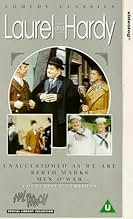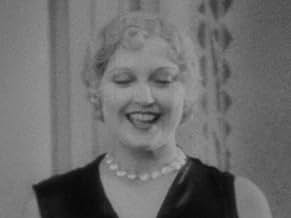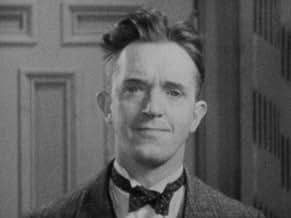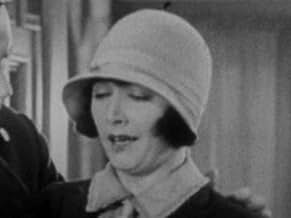Füge eine Handlung in deiner Sprache hinzuWhen Mrs. Hardy refuses to cook supper, Mr. Hardy decides to cook it for himself and Mr. Laurel, but things go wrong during a jealous mix-up with the next-door married couple.When Mrs. Hardy refuses to cook supper, Mr. Hardy decides to cook it for himself and Mr. Laurel, but things go wrong during a jealous mix-up with the next-door married couple.When Mrs. Hardy refuses to cook supper, Mr. Hardy decides to cook it for himself and Mr. Laurel, but things go wrong during a jealous mix-up with the next-door married couple.
Empfohlene Bewertungen
The marital squabbling between Ollie and Mae Busch, later developed into a fine art, feels a little forced here, and occasionally suggests an improv exercise in an acting class. And while it's always a pleasure to see Thelma Todd and Edgar Kennedy in support, it's apparent that they're just as uncomfortable the new technology as our two stars. Generally speaking Stan comes off better than Ollie because so much of his material is visual, allowing for his hilariously over-scaled reactions. It could be mentioned too that Stan had more extensive stage experience than most of his colleagues, and was therefore more comfortable delivering dialog.
Still and all, Unaccustomed As We Are is a decent maiden effort in the new medium, and there are some interesting attempts to experiment with sound, as when Ollie puts on a jazz record during one of Mae's tirades and causes her to unintentionally rant in time to the music. It's kind of odd, but amusing. Other bits involving off-stage explosions, fights, and crash-bang sound effects must have made more of an impression when the film premiered, when their impact was still so new. But the major problem here is uncertainty about what sort of material will work in talkies and what won't. For instance, there are moments when the guys strike deliberately theatrical poses and deliver their lines in the style of ham actors, as when Ollie threatens to leave for South America "to do Big Things!" Cute, but this sort of shtick played a lot better in the silent days, and they would soon leave it behind. Dedicated Laurel & Hardy buffs will surely want to see their first talkie, but even the fans need to make allowances for (understandable) awkwardness and remember that soon after this debut, after a little more practice, the guys were producing talkies as strong as their late silent output.
A couple of technical notes: a silent version of Unaccustomed As We Are was also released in 1929 for theaters not yet wired for sound, and for many years it was the only version available, but it's deadly to watch and should be avoided. The major element of interest here, after all, is to observe how the gang at the Roach Studio handled the new technology, and without that you've got nothing. The soundtrack was not re-discovered until the 1970s, and, in the version of this film currently available on DVD, Reel Two is in pretty rough shape. During the latter scenes you can detect a strange, metallic echo under the dialog, which at times sounds almost like the chirping of birds. That's the closest you'll get to hearing the Koo-Koo Song in this one!
P.S. I'm pleased to add that there's a newly restored version of this film now available, and the sound quality in the second reel is much improved.
The story sounds simple and so is the movie. It's simple but effective. The comical situations work out well and it makes this movie a worthy first 'talkie' for the two boys. It's not their best or most original movie but it serves its purpose. The plot line for this movie was later reused for the other Laurel & Hardy picture; "Block-Heads", which to be honest is better executed in that movie and it's a more superior movie in general.
Nothing remarkable, just another fine executed and timed enjoyable comical short from Laurel & Hardy, with also the Laurel & Hardy regulars Thelma Todd, Mae Busch and Edgar Kennedy in it.
7/10
http://bobafett1138.blogspot.com/
"Unaccustomed As We Are" was one of the first films to be shot on the new sound stage producer and studio owner Hal Roach built in the spring of 1929. The movie's title is drawn from the then popular phrase "Unaccustomed as we are to public speaking," which, despite the pair's previous stage experience, was still a somewhat jarring experience for all the actors on the set miked up for the first time. Laurel especially was wary about being amplified by the sound system because he was known to have a slight lisp and felt the technology would exaggerate his speech defect. It turned out no one picked up the lisp.
Directors Lewis Foster and Hal Roach used the new audio devices to great effect in "Unaccustomed As We Are.." When Edgar Kennedy is bragging about his female escapades to Laurel and Hardy, his wife is hiding in a traveling trunk so she wouldn't be discovered having the two men in her apartment. She later emerges enraged at his philandering and throws everything she can get her hands on at him. As the comedic pair retreat to their apartment across the hall, the noise heard off-camera emphasizes the violence taking place, an audio technique which will be used in many future comedies. Similarly, when Laurel falls down several flights of stairs, viewers don't actually see him tumbling, but they hear his body hitting the hard stairs. Such sound effects were impossible to replicate in silent films.
Throughout their movie careers, Laurel and Hardy were known for their catchphrases. "Unaccustomed As We Are" was the first time Hardy says "Why don't you do something to help me." The movie had to be shot during the evenings since Hal Roach had money to outfit only one studio set for audio. The 'Our Gang' film "Small Talk" was using the same set during mornings and afternoons because the childhood actors were restricted to only day shoots.
Wusstest du schon
- WissenswertesThis was Laurel and Hardy's first talkie as well as the first all-talkie short released by the Hal Roach Studios. Three shorts that were already completed were withheld in order to rush this into release. The three completed shorts were then released with music and sound effects added.
- Zitate
Mrs. Kennedy: Oh, good evening, Mr Hardy.
Ollver Hardy: Good evening, Mrs Kennedy. This my friend, Mrs Kennedy.
Mrs. Kennedy: Good evening.
Ollver Hardy: I brought him home for dinner, Mrs Kennedy.
Mrs. Kennedy: Oh, how lovely of you, Mr Hardy.
Ollver Hardy: How is Mr Kennedy, Mrs Kennedy?
Mrs. Kennedy: Oh, he's very well, thank you, Mr Hardy.
Ollver Hardy: Is Mr Kennedy home, Mrs Kennedy?
Mrs. Kennedy: No he isn't, Mr Hardy. I must be going. Good night, Mr Hardy.
Ollver Hardy: Good night, Mrs Kennedy.
[to Stan]
Ollver Hardy: That was Mrs Kennedy
[Stan seems taken aback]
Ollver Hardy: Well, what's the matter?
Stan: I was wondering who it was.
- Alternative VersionenWhen originally released theatrically in the UK, the BBFC made cuts to secure a 'U' rating on both sound and silent versions. All cuts were waived in 1987 when the film was granted a 'U' certificate for home video.
- VerbindungenEdited into Ein Tolpatsch kommt selten allein (1982)
Top-Auswahl
Details
- Erscheinungsdatum
- Herkunftsland
- Offizieller Standort
- Sprache
- Auch bekannt als
- Their Last Word
- Drehorte
- Produktionsfirma
- Weitere beteiligte Unternehmen bei IMDbPro anzeigen
- Laufzeit21 Minuten
- Farbe
Zu dieser Seite beitragen


